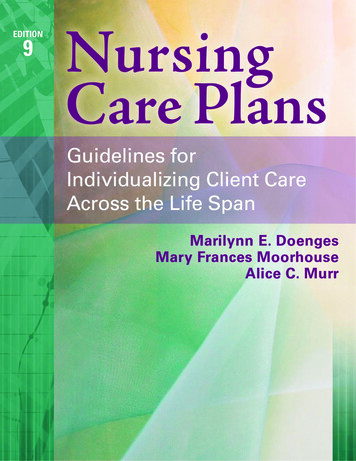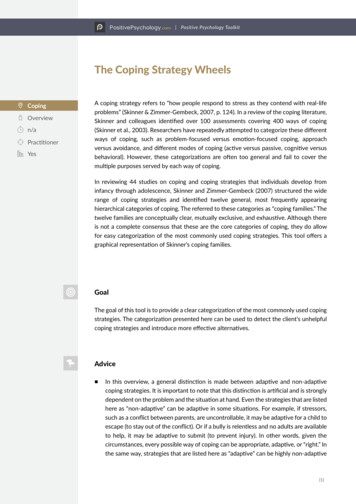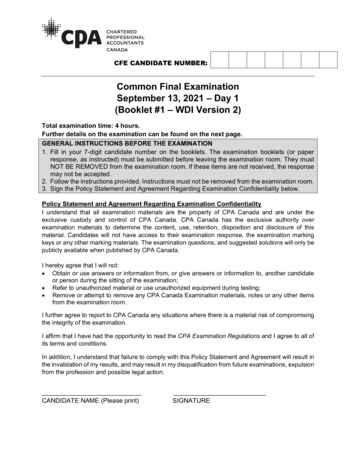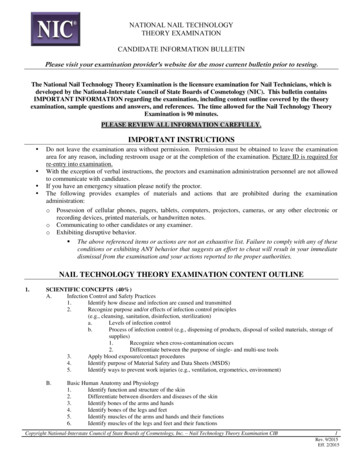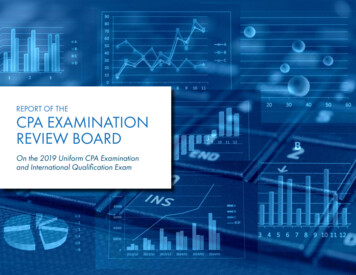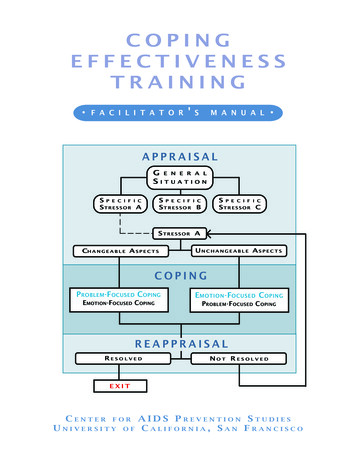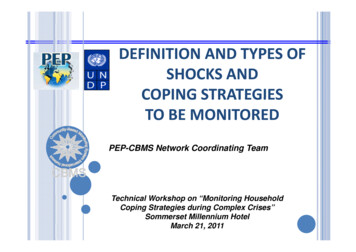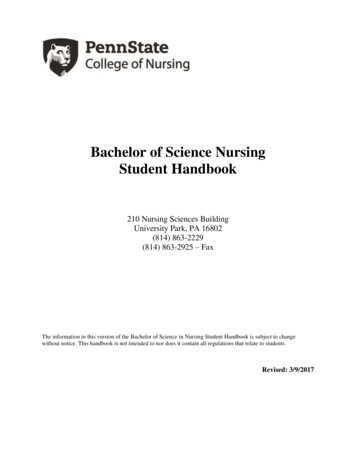
Transcription
Journal of Education and Human DevelopmentMarch 2019, Vol. 8, No. 1, pp. 57-68ISSN: 2334-296X (Print), 2334-2978 (Online)Copyright The Author(s). All Rights Reserved.Published by American Research Institute for Policy DevelopmentDOI: 10.15640/jehd.v8n1a8URL: https://doi.org/10.15640/jehd.v8n1a8An Examination of Academic Coping and Procrastination from the Self-DeterminationTheory PerspectiveShu-Shen Shih1AbstractThe present study attempted to examine factors related to Taiwanese adolescents’ academic coping andprocrastination. Three hundred and eighty-nine ninth grade Taiwanese students completed a self-reportedsurvey assessing their perceptions of parental psychological control, satisfaction of basic psychological needs(i.e., the needs for autonomy, competence, and relatedness), academic coping, and procrastination. Results ofhierarchical regressions suggested that in terms of predictors of academic coping, parental psychologicalcontrol positively predicted disengagement coping. Autonomy and competence need satisfaction alsoemerged as significant predictors of academic coping. As for the determinants of academic procrastination,engagement and disengagement coping both functioned as significant predictors of students’ procrastinationon homework and exam preparation. Engagement coping negatively predicted academic procrastination. Bycontrast, disengagement coping was a positive predictor. Additionally, parental control positively predictedprocrastination on exam preparation, whereas competence need satisfaction was a negative predictor.Implications for practices and future research were discussed.Keywords: academic coping, academic procrastination, parental psychological control, basic psychologicalneeds1. IntroductionAcademic pressures were identified as the essential sources of stress that Taiwanese adolescents experience(Chen et al., 2015). The Taiwanese education system requires all the ninth-grade students to take the joint entranceexam for senior high schools (Grade 10-12). The priority goal for Taiwanese junior high students is to obtainsatisfactory scores on the entrance exam. Many Taiwanese regard academic achievement as the main route towardsocial and economic advancement. Taiwanese junior high students usually spend a great deal of time on exampreparation and find school stressful (Chen et al., 2015; Shih, 2012). Previous findings indicated that adolescents werefaced with a range of school-related stressors such as poor test grades, difficulty with completing homework, andproblems with understanding the material presented in class (Suldo, Shaunessy, & Hardesty, 2008). However, howteenagers coped with these stressors was an understudied topic (Leonard et al., 2015).When students encountered academic stress, how they interpreted and reacted to academic challenges (i.e.,academic coping) appeared to influence their success and satisfaction. Students who possessed adaptive copingresources were likely to respond to the stress without experiencing compromised functioning (Krypel & HendersonKing, 2010; Skinner & Zimmer-Gembeck, 2016). Previous studies on academic coping, nonetheless, were primarilylimited to Caucasian samples. These studies did not examine coping and school adjustment in more diversepopulations (Compas, Connor-Smith, Saltzman, Thomsen, & Wadsworth, 2001). Since academic stress seemed closelyrelated to students’ maladjustment in the Taiwanese school context (Chen et al., 2015), in the present study,Taiwanese adolescents’ academic coping was investigated.National Chengchi University, Taipei, Taiwan, The Institute of Teacher Education, National Chengchi UniversityNo. 64, Sec. 2, ZhiNan Rd., Wenshan District 11605, Taipei, Taiwan, Email , Telephone: 886-2-29393091ext880161
58Journal of Education and Human Development, Vol. 8, No. 1, March 20191.1 Academic CopingAcademic coping refers to the efforts that students make to react to academic challenges, setbacks, anddifficulties (Krypel & Henderson-King, 2010). With respect to the dimensions or categories of coping, the distinctionbetween engagement and disengagement coping, according to Carver and Connor-Smith (2010), appeared to have thegreatest importance. The very distinction therefore received substantial attention in research with differentpopulations including children, adolescents, and adults. Engagement coping is characterized by responses that areoriented either toward the source of stress (e.g., problem-focused coping) or toward the person’s emotions orthoughts (e.g., emotion regulation or cognitive restructuring). Disengagement coping refers to responses that areoriented away from the stressors (e.g., withdrawal or denial). People adopting disengagement coping are inclined to actas though the stressor does not exist or try to distract themselves from it. Because disengagement coping does notdirectly deal with the stressor’s existence and its eventual impact, this type of coping generally does not help to easestress in the long run (Carver & Connor-Smith, 2010; Compas et al., 2001). In classroom settings, engagement inschoolwork normally contributes to students’ subsequent learning outcomes. By adopting the distinction betweenengagement and disengagement coping and investigating the likely predictors of each type of coping, it was hopedthat findings of the current study would provide insights into the determining mechanisms of coping responses withinthe Taiwanese academic context.Students who coped with academic stress by facing the actual challenge (i.e., engagement coping) showedintrinsic interest in academic work (Appelhans & Schmeck, 2002). They took personal responsibility for their ownacademic behaviors and expended considerable efforts in their work. Also, students employing engagement copingdisplayed higher levels of self-efficacy in their ability to complete academic tasks. On the contrary, students whoadopted disengagement coping to handle academic difficulties tended to show passive, withdrawn, anxious, anddepressed behaviors. They were apt to refrain from taking part in class activities and to procrastinate on homework(Skinner & Wellborn, 1997). In other words, engagement coping could ameliorate students’ tendency to procrastinate,whereas disengagement coping was likely to heighten their proclivity to delay completing a task.1.2 Academic ProcrastinationAcademic procrastination can be described as an irrational tendency to delay in the completion of anacademic task, even to the point of creating emotional discomfort and anxiety (Sénecal, Julien, & Guay, 2003).Students may intend to perform an academic activity within the expected or desired time frame, yet failing to motivatethemselves to carry out the intention. It was estimated that 80% to 95% of college students engaged in procrastinationconsistently and problematically (Yerdelen, McCaffrey, & Klassen, 2016). Academic procrastination could betroubling to these students because results of previous studies revealed that procrastination was linked to a variety ofnegative outcomes including poor academic performance, missing or late assignments, anxiety during tests, and use ofself-handicapping strategies (Dewitte & Schouwenburg, 2002; Kim & Seo, 2015; Lee, 2005; Park & Sperling, 2012).Procrastination also caused damaging mental health outcomes such as depression and lower levels of self-esteem (Lay& Schouwenburg, 1993; Tice & Baumeister, 1997).Despite the well-documented evidence of the negative impact of academic procrastination on learning andpsychological well-being among students, the antecedents of procrastination were yet to be determined (Steel, 2007).Moreover, the vast majority of existing research was focused on college students samples. There was shortage ofstudies on academic procrastination among adolescent students. To address this paucity, in addition to examining therelationship between academic coping and procrastination, the present study also attempted to explore factors relatedto Taiwanese junior high students’ academic procrastination.1.3 Satisfaction of Basic Psychological NeedsThere was evidence that students’ motivation and engagement were mainly determined by the degree towhich their basic psychological needs were met (Ryan & Deci, 2017). Self-determination theory (SDT; Ryan & Deci,2017) is a widely studied theory of human motivation that provides a framework for understanding human tendencytoward active engagement and development. According to SDT, the three basic needs (i.e., the needs for autonomy,competence, and relatedness) serve as intrapersonal resources that guide individuals’ coping in stressful encounters(Skinner & Wellborn, 1997). Autonomy refers to the need to experience one’s behavior as freely chosen andvolitional. Competence refers to the need to feel efficacious while interacting with the social environment, such ascompleting a learning project.
Shu-Shen Shih59Relatedness refers to the need to feel connected to significant others, like parents or friends. SDT posits thata sense of autonomy constitutes an important psychological resource for dealing with stressful demands. Individualswith a sense of autonomy were prone to appraise objective stressors as challenges rather than threats and, in turn,utilized engagement coping to overcome obstacles. In contrast, students with low levels of autonomy tended torespond to challenging situations with high distress and frustration. Accordingly, they were likely to employdisengagement coping and academic procrastination to avoid negative emotions associated with encountereddifficulties (Skinner & Edge, 2002). Put in another way, autonomy need satisfaction enabled students to proactivelycope with academic stress. The active engagement arising from adaptive coping was conducive to easing students’procrastination.As for a sense of competence, it constitutes the underlying process of control (Ryan & Deci, 2017). Aperson’s sense of control was found to have powerful effects on how he or she coped with stress (Folkman, 2011).Individuals with great confidence in their ability to overcome obstacles were inclined to construe failures and stressorsas challenges. Generally, they used problem solving and strategizing to tackle difficulties. Put differently, studentswhose need for competence was fulfilled tended to adopt engagement coping to deal with academic demands. Bycontrast, people who lacked a sense of competence often became pessimistic and doubting when faced with setbacks.They tended to use disengagement coping to shy away from the stressor if possible (Dweck & Molden, 2017).Moreover, students who felt efficacious usually demonstrated good time management skills when it came tohomework completion and exam preparation (Brdar, Rijavec, & Loncaric, 2006). Previous findings indicated that ahigher sense of control (i.e., competence need satisfaction) appeared to repel one’s inclination to procrastinate (Steel,2007).Relatedness may also have a role in adolescents’ academic coping and procrastination. Social support was oneof the most effective means through which people coped with difficult and stressful events. Those who receivedsocial support buffered themselves from the adverse mental and physical health effects of stress. Attachment theoryposits that the proximal predictors of adaptive coping are individuals’ experiences with supportive relationships.People with loving relationships coped with stress better than those who were more socially isolated (Kim, Sherman,& Taylor, 2008; Skinner & Edge, 2002). Satisfaction of the need for relatedness is conceptualized as individuals’convictions about their own lovability and their expectations that social partners can be trusted to be warm andavailable when needed. Students whose need for relatedness was taken care of reacted to potential threats with littledistress and with active attempts to solve the problems (Skinner & Zimmer-Gembeck, 2016). Academicprocrastination was supposedly reduced as a consequence.Skinner and her colleagues (Skinner & Edge, 2002; Skinner & Zimmer-Gembeck, 2016) suggested thatpeople’s appraisals of whether the three psychological needs were fulfilled were crucial mechanisms that broughtabout individual differences in coping. By exploring the effects of satisfaction of the three basic needs on academiccoping and procrastination, how the needs for autonomy, competence, and relatedness were related to one’s academicself-regulation would be determined.1.4 Psychological ControlIn contrast to the beneficial effects of satisfaction of basic psychological needs on individuals’ developmentof self-governing functioning, psychological control refers to control attempts that intrude into the psychological andemotional development of the person through use of manipulative techniques like guilt induction and love withdrawal(Soenens, Vansteenkiste, Luyten, Duriez, & Goosens, 2005). Previous findings revealed that when interpersonalcontexts were psychologically controlling, individuals’ self-esteem hinged on performance, namely, contingent selfesteem. Contingent self-esteem required that one continuously matched some standard of excellence to feel worthy.This type of ego involvement led people to focus on proving and defending themselves rather than pursuing growthand challenge (Ryan & Deci, 2017). Soenens et al. (2005) also found that individuals experiencing psychologicalcontrol doubted their behavior. They engaged in negative self-evaluation and had strong concerns about theirpotential mistakes. It was inferred that adolescents who perceived psychological control from their parents were apt toadopt avoidance strategies such as disengagement coping and procrastination to defend their fragile self-worth.1.5 The Present StudyIn summary, the purpose of the present study was to determine the mechanisms associated with Taiwaneseadolescents’ academic coping and procrastination.
60Journal of Education and Human Development, Vol. 8, No. 1, March 2019Specifically, this study was devised to examine the following hypotheses: (a) Students’ perceptions of parentalpsychological control and satisfaction of basic psychological needs (i.e., the needs for autonomy, competence, andrelatedness) would significantly predict their engagement and disengagement coping; (b) Students’ perceptions ofparental psychological control, satisfaction of basic psychological needs, and academic coping (i.e., engagement anddisengagement coping) would significantly predict their procrastination on homework and exam preparation. To testthese hypotheses, four individual hierarchical regressions were performed in order that factors significantly predictedengagement and disengagement coping as well as procrastination on homework and exam preparation would bedetected. On the basis of previous findings (Skinner & Zimmer-Gembeck, 2016; Soenens et al. 2005), students’perceptions of parental control and satisfaction of basic psychological needs were presumed to be determinants oftheir academic coping. Hierarchical regressions were selected as the data analytic technique so that the values ofvariance explained by each set of predictors could be calculated (Tabachnick & Fidell, 2013). In the similar vein,students’ perceptions of parental control, satisfaction of basic psychological needs, and academic coping wereexpected to function as predictors of their procrastination on homework and exam preparation (Brdaret al., 2006;Ryan & Deci, 2017; Steel, 2007). To evaluate the amount of variance in academic procrastination accounted for byeach set of factors, hierarchical regression analyses were also employed.With regard to the sequence of entry of predicting factors in hierarchical regression models, according toTabachnick and Fidell’s suggestion (2013), independent variables that were presumed to be causally prior were givenhigher priority. Based upon SDT, students’ satisfaction of basic psychological needs was likely to be influenced byparental psychological control (Ryan & Deci, 2017). For this reason, in the hierarchical regression analyses predictingacademic coping, perceived parental psychological control was entered as the predictor in block 1 and satisfaction ofneeds for autonomy, competence, and relatedness was entered in block 2. As for hierarchical regressions predictingacademic procrastination, because of the reason mentioned above, perceived parental psychological control wasentered in block 1. In block 2, students’ satisfaction of needs for autonomy, competence, and relatedness was entered.Given that both perceived parental psychological control and satisfaction of basic psychological needs were thoughtto affect the way in which individuals coped with academic stress (Skinner & Zimmer-Gembeck, 2016), students’ useof academic coping strategies was entered in block 3 as the predictor of academic procrastination.2. Method2.1 ParticipantsThe participants included 389 ninth-grade Taiwanese students from twelve classes in four junior high schools.Participating schools were located in the northern part of Taiwan. All of school principals granted initial consent fordata to be collected in their schools. The 210 boys (54%) and 179 girls ranged in age from 14 years to 15 years, 9months (M 14 years, 8 months, SD 4 months). The school districts were primarily middle class in terms ofsocioeconomic status. All of the participants were Taiwanese. Students’ participation was voluntary. Guidelines for theproper treatment of human subjects were followed (APA, 2010). All participants had parental consent to take part inthe study. Confidential treatment of the data was guaranteed.2.2 ProcedureThe data were collected at the beginning of the ninth grade. Students were invited to fill out a survey(described in detail below) during regular class time. It took participants about 20-25 minutes to complete thequestionnaire. There were two research assistants in each class for the data collection. They assured students of theconfidentiality of their self-reports and encouraged them to respond to all items as accurately as possible.2.3 MeasuresParticipants were instructed to respond to all items using a five-point Likert scales, ranging from 1 (stronglydisagree) to 5 (strongly agree). A Chinese language version of this self-report survey was used. All measures utilized inthe present study were translated into Chinese and then back-translated into English. To ensure adequate translation,guidelines of the International Test Commission (Hambleton, 1994) were followed. Specifically, the translationprocess took account of linguistic and cultural qualities among Taiwanese adolescents. Participants’ familiarity withitem format, item content, and test procedures was ensured by checking with two Taiwanese junior high studentsduring the translation process. Information on each scale used in the present study is detailed below. Table 1summarizes the numbers of scale items, example items, and Cronbach’s Alpha coefficients for the scales.
Shu-Shen Shih612.3.1 Parental control. Students’ perceptions of parental psychological control were assessed by the ParentalPsychological Control Scale (Shek, 2006). Ten items assessed parental psychological control in a global manner (e.g.,“My parents want to control everything in my life”). Higher scores represented a higher level of perceivedpsychological control in the family context. This scale demonstrated good reliability with a Cronbach’s α of .93.2.3.2 Satisfaction of the basic psychological needs. Students’ satisfaction of the basic psychological needswas assessed by the Basic Need Satisfaction at Work Scale (Baard, Deci, & Ryan, 2004). This scale was used tomeasure the extent to which students experienced satisfaction of their needs for autonomy (e.g., “I feel like I canpretty much be myself in my classroom”; 4 items; α .86), competence (e.g., “Most days I feel a sense ofaccomplishment from learning”; 4 items; α .82), and relatedness (e.g., “My classmates are pretty friendly towardme”; 4 items; α .75). Higher scores represented a higher level of satisfaction of the basic psychological needs.2.3.3 Academic coping strategies. Students’ use of academic coping strategies was assessed by the scaleadapted from the Coping Orientations to Problems Experienced (COPE) inventory developed by Carver, Scheier, andWeintraub (1989). This inventory was used to measure the ways in which the general population responded to stressacross different situations. Given that the current study was intended to investigate students’ coping responses inacademic settings, the word “problem” in the original items was changed to “academic problem” when students’tendency to cope with academic stress was assessed. The adapted academic coping inventory consisted of two scales.Engagement coping was comprised of three subscales (i.e., Active coping: “I take additional action to try to get rid ofthe academic problem”; 4 items; Planning: “I think about how I might best handle the academic problem”; 4 items;Suppression of competing activities: “I put aside other activities in order to concentrate on schoolwork”; 2 items; α .93). Disengagement coping was comprised of four items (e.g., “I reduce the amount of effort I am putting intosolving the academic problem”; α .74).2.3.4 Academic procrastination. Students’ tendency to academic procrastination was assessed by theAcademic Procrastination Questionnaire (Huang, 2009). This scale was originally developed to measure collegestudents’ inclinations of procrastination in different academic situations. Because the current study was devised toinvestigate junior high students’ academic procrastination, very few items were modified according to adolescentstudents’ experiences in school. The adapted academic procrastination questionnaire consisted of two subscales. Thescale of procrastination on homework had 6 items that measured students’ procrastination behaviors when doinghomework (e.g., “I usually wait until the last minute to start my homework”). Higher scores indicated a highertendency to procrastinate on completing homework. This scale demonstrated good reliability with a Cronbach’s α of.90. The scale of procrastination on exam preparation consisted of 6 items that measured students’ tendency toprocrastinate on preparation when the exam was approaching (e.g., “While preparing for the examination, I usuallyprocrastinate on carrying out my study plan”). Higher scores reflected a higher tendency to procrastinate on exampreparation. Cronbach’s α was .86.
62Journal of Education and Human Development, Vol. 8, No. 1, March 2019Table 1ScaleParental controlNumberof items10Autonomy need satisfaction4Competence need satisfaction4Relatedness need satisfaction4Engagement coping10Disengagement coping4Procrastination on homework6Procrastinationpreparation6onexamExample itemsAlphaMy parents want to control everything in my life.My parents want to change me to meet their standard.I feel like I can pretty much be myself in my classroom.I am free to express my ideas and opinions in my classroom.Most days I feel a sense of accomplishment from learning.When I am working in my classroom I often feel very capable.My classmates are pretty friendly toward me.I get along with my classmates.I take additional action to try to get rid of the academic problem.I think about how I might best handle the academic problem.I reduce the amount of effort I am putting into solving the academicproblem.I just give up trying to reach my goal.I usually wait until the last minute to start my homework.I usually procrastinate on carrying out the plan of doing homework.While preparing for the exam, I usually procrastinate on carrying outmy study plan.I usually postpone my study for exam because of other activities.82.85.70.88.78.91.90.86Numbers of Items, Example Items, and Alpha Coefficients for Scales Used in the Present Study3. Results3.1 Regression AnalysesDescriptive information and correlations for study variables are shown in Table 2. Results from regressionanalyses are presented first for outcomes regarding students’ use of academic coping strategies and then for theiracademic procrastination. In the preliminary analysis, gender was entered first in regression models. Results of thepreliminary analysis suggested that gender failed to predict any outcome variable of interest. Accordingly, gender wasnot included as a predicting variable in the present study. The alpha level used to determine the significance of all ofthese analyses was set at .01. This more conservative alpha level was selected to reduce the possibility of making aType I error arising from completing a series of analyses with related outcomes (Tabachnick & Fidell, 2013).Table 2. Descriptive Statistics and Correlations for Study Variables (N 389)Scale1. Parental control2. Autonomy need essneedsatisfaction5. Engagement coping6. Disengagement coping7.Procrastinationonhomework8. Procrastination on exampreparationMSDNote. * p .05. ** p 4.822.791.003.13.86
Shu-Shen Shih633.2 Hierarchical Regressions Predicting Students’ Engagement and Disengagement Coping3.2.1 Engagement coping. Results of hierarchical regressions predicting students’ academic coping are displayed inTable 3. In the hierarchical regression analysis predicting engagement coping, perceived parental psychological control(Step 1) and autonomy, competence, and relatedness need satisfaction (Step 2) were regressed on engagement coping.Perceived parental control was entered in the first regression model and failed to significantly predict engagementcoping, F(1, 387) 3.45, p .01, R2 .01. In Step 2, students’ satisfaction of needs for autonomy, competence, andrelatedness was individually included in the model. Adding these variables increased the amount of variance explainedfor engagement coping by 44%, F(4, 384) 76.46, p .001, R2 .45. Results from this step suggested that autonomyand competence need satisfaction positively predicted engagement coping.3.2.2 Disengagement coping. In this set of regression analysis, perceived parental psychological control (Step 1) andautonomy, competence, and relatedness need satisfaction (Step 2) were regressed on disengagement coping. Theamount of variance (14%) explained by students’ perceptions of parental control in the first step of the regressionmodel was statistically significant for disengagement coping, F(1, 387) 64.71, p .001, R 2 .14. Perceived parentalpsychological control was found to positively predict students’ disengagement coping. Adding students’ satisfaction ofbasic psychological needs in Step 2 increased the amount of variance explained for disengagement coping by 2%, F(4,384) 18.98, p .001, R2 .16. When parental control was taken into account, autonomy need satisfaction negativelypredicted disengagement coping.Table 3. Summary of Hierarchical Regression Analyses Predicting Academic Coping (N 389)VariableStep 1Parental controlStep 2Parental controlAutonomy need satisfactionCompetence need satisfactionRelatedness need satisfactionEngagement copingβt-.09-1.86.67.02.38.14** 2.61.54*** 11.55.071.43R2 R2.01 .01.45Disengagement copingβtRR2 R2.37 .14.38*** 8.04.44.40.16.02.35*** 7.15-.17** -2.71.01.13.04.57Note. **p .01.*** p .001. R2 denotes change in R23.3 Hierarchical Regressions Predicting Students’ Academic Procrastination3.3.1 Procrastination on homework. Table 4 presents results of hierarchical regressions predicting students’academic procrastination. In the hierarchical regression analysis predicting procrastination on homework, perceivedparental psychological control (Step 1), autonomy, competence, and relatedness need satisfaction (Step 2), as well asengagement and disengagement coping (Step 3) were regressed on this predicted outcome. The amount of variance(5%) explained by students’ perceptions of parental control in the first step of the analysis was significant for students’procrastination on homework, F(1, 387) 20.70, p .001, R2 .05. Parental control positively predicted this type ofacademic procrastination. In Step 2, students’ satisfaction of basic psychological needs was individually included in themodel. Adding these variables increased the amount of variance explained for procrastination on homework by 8%,F(4, 384) 13.92, p .001, R2 .13.Results from this step suggested that when parental control was controlled for, competence need satisfactionwas negatively associated with procrastination on homework. In Step 3, students’ engagement and disengagementcoping were entered. Adding these variables increased the amount of variance explained for procrastination onhomework by 12%, F(6, 382) 20.30, p .001, R2 .25.When other predictors were controlled for, students’ engagement coping negatively predicted students’tendency to delay completing homework. In contrast, the use of disengagement coping strategies positively predictedprocrastination on homework.3.3.2 Procrastination on exam preparation. In the hierarchical regression analysis predictingprocrastination on exam preparation, perceived parental psychological control (Step 1), autonomy, competence, andrelatedness need satisfaction (Step 2), as well as engagement and disengagement coping (Step 3) were regressed on thisdependent variable.
64Journal of Education and Human Development, Vol. 8, No. 1, March 2019Perceived parental psychological control was entered in Step 1 and accounted for a significant amount ofvariance (6%) in students’ procrastination on exam preparation, F(1, 387) 25.11, p .001, R2 .06. Parentalpsychological control was positively associated with procrastination on exam preparation. Results from Step 2 showed
shusshen@nccu.edu.tw;shushenshih@gmail.com, Telephone: 886-2-29393091ext88016 . 58 Journal of Education and Human Development, Vol. 8, No. 1, March 2019 1.1 Academic Coping Academic coping refers to the efforts that students make to react to academic challenges, setbacks, and .
